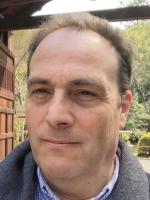
Career
- 2018-date: Royal Society E.P. Abraham Professor, DAMPT, Cambridge
- 2011-date: Herchel Smith Chair in Physics, Cavendish Laboratory,
- Cambridge
- 2002-2010: Personal Chair in the Theory of Condensed Matter, Cavendish Laboratory,
- Cambridge
- 2000-2002: University Readership in the Theory of Condensed Matter, Cavendish Laboratory, Cambridge
- 1995-1999: Lecturer, Cavendish Laboratory, Cambridge
- 1995-date: Fellow, St John’s College, Cambridge
- 1994-1995: Royal Society Research Fellow and Lecturer, Imperial College, London
- 1990-1991: Junior Research Fellow, Gonville and Caius College, Cambridge
Research
Ben is a member the Department of Applied Mathematics and Theoretical Physics and the Cavendish Laboratory, Department of Physics. He also holds affiliated positions in the Wellcome Trust/CRUK Gurdon Institute and the Wellcome Trust/MRC Stem Cell Institute. His research interests have spanned a wide range of topics within the area of theoretical quantum condensed matter physics. However, his current interests are focussed on the application of modelling approaches to study the dynamics of biological systems, from subcellular processes, to cell fate decision-making and morphogenic processes. His research is supported by grants from EPSRC, the Wellcome Trust, CRUK and the Royal Society.
Selected Publications
- S. Rulands, et al., Universality of clone dynamics during tissue development, Nature Physics 14, 469-474 (2018)
- E. Hannezo, et al., A unifying theory of branching morphogenesis, Cell 171, 242-255 (2017)
- X. Lan, et al., Cell fate mapping of human glioblastoma reveals an invariant stem cell hierarchy pre- and post-treatment, Nature 549, 227-232 (2017)
- A. Sanchez-Danes, et al., Defining the clonal dynamics leading to tumor initiation, Nature 536, 298-303 (2016)
- B. D. Simons and H. Clevers, Strategies of stem cell self-renewal in adult tissues, Cell 145, 851-862 (2011)
- C. Lopez-Garcia, et al., Intestinal stem cell replacement follows a pattern of neutral drift, Science 330, 822-825 (2010)
Publications
Lifting regenerative barriers promotes epithelial cell fate plasticity supporting lineage conversion
– Nature communications
(2025)
16,
11305
(doi: 10.1038/s41467-025-66446-9)
Author Correction: Mechanisms of stretch-mediated skin expansion at single-cell resolution
– Nature
(2025)
648,
e1
(doi: 10.1038/s41586-025-09878-z)
Cell cycle criticality as a mechanism for robust cell population control
– Mol Syst Biol
(2025)
22,
241
(doi: 10.1038/s44320-025-00164-8)
Recovery of human upper airway epithelium after smoking cessation is driven by a slow-cycling stem cell population and immune surveillance
(2025)
(doi: 10.1101/2025.08.26.672394)
Corrections in single-cell migration path in vivo are controlled by pulses in polar Rac1 activation
– Current biology : CB
(2025)
35,
4365
(doi: 10.1016/j.cub.2025.07.063)
Cell cycle criticality as a mechanism for robust cell population control
(2025)
(doi: 10.1101/2025.06.12.659375)
Aberrant basal cell clonal dynamics shape early lung carcinogenesis.
– Science (New York, N.Y.)
(2025)
388,
eads9145
(doi: 10.1126/science.ads9145)
Coordinated regulation of self-renewal and cell cycle during human lympho-myeloid lineage restriction
– Blood
(2025)
146,
693
(doi: 10.5281/zenodo.14990643)
A computational pipeline for spatial mechano-transcriptomics
– Nat Methods
(2025)
22,
1
(doi: 10.1038/s41592-025-02618-1)
- 1 of 31
